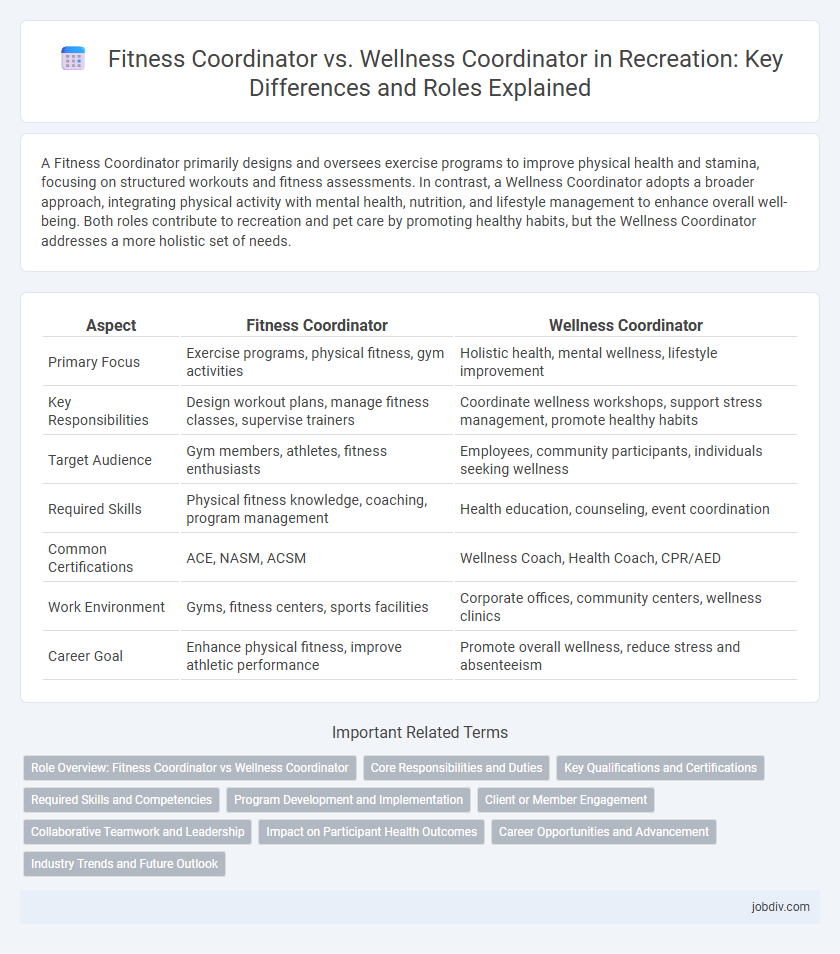A Fitness Coordinator primarily designs and oversees exercise programs to improve physical health and stamina, focusing on structured workouts and fitness assessments. In contrast, a Wellness Coordinator adopts a broader approach, integrating physical activity with mental health, nutrition, and lifestyle management to enhance overall well-being. Both roles contribute to recreation and pet care by promoting healthy habits, but the Wellness Coordinator addresses a more holistic set of needs.
Table of Comparison
| Aspect | Fitness Coordinator | Wellness Coordinator |
|---|---|---|
| Primary Focus | Exercise programs, physical fitness, gym activities | Holistic health, mental wellness, lifestyle improvement |
| Key Responsibilities | Design workout plans, manage fitness classes, supervise trainers | Coordinate wellness workshops, support stress management, promote healthy habits |
| Target Audience | Gym members, athletes, fitness enthusiasts | Employees, community participants, individuals seeking wellness |
| Required Skills | Physical fitness knowledge, coaching, program management | Health education, counseling, event coordination |
| Common Certifications | ACE, NASM, ACSM | Wellness Coach, Health Coach, CPR/AED |
| Work Environment | Gyms, fitness centers, sports facilities | Corporate offices, community centers, wellness clinics |
| Career Goal | Enhance physical fitness, improve athletic performance | Promote overall wellness, reduce stress and absenteeism |
Role Overview: Fitness Coordinator vs Wellness Coordinator
A Fitness Coordinator manages and implements exercise programs, focusing on physical training, strength building, and cardiovascular health to improve overall fitness levels. A Wellness Coordinator designs and oversees holistic health initiatives, incorporating nutrition, stress management, and mental well-being to promote comprehensive lifestyle improvements. Both roles collaborate to enhance individual and community health but emphasize different aspects of physical and mental wellness within recreational settings.
Core Responsibilities and Duties
Fitness Coordinators develop and implement exercise programs, manage gym operations, and lead fitness classes to enhance physical health. Wellness Coordinators design holistic wellness initiatives addressing mental, emotional, and physical well-being through workshops, counseling, and health education. Both roles collaborate with staff and clients but differ in their emphasis on physical fitness versus overall wellness management.
Key Qualifications and Certifications
Fitness Coordinators typically hold certifications such as ACE Certified Personal Trainer or ACSM Certified Fitness Trainer, emphasizing expertise in exercise programming, strength training, and client fitness assessments. Wellness Coordinators often possess credentials like Certified Health Education Specialist (CHES) or Certified Wellness Program Coordinator (CWPC), focusing on holistic health strategies, stress management, and lifestyle coaching. Both roles require strong communication skills and knowledge of health promotion, but Fitness Coordinators prioritize physical activity planning while Wellness Coordinators emphasize overall well-being and preventive health education.
Required Skills and Competencies
A Fitness Coordinator requires strong expertise in exercise physiology, program design, and client motivation to develop and lead effective physical training sessions. A Wellness Coordinator focuses on skills related to holistic health promotion, including nutrition knowledge, stress management techniques, and behavioral change strategies. Both roles demand excellent communication, organizational abilities, and the capacity to assess individual needs for personalized health plans.
Program Development and Implementation
A Fitness Coordinator specializes in designing and implementing physical exercise programs tailored to improve strength, endurance, and overall fitness levels, often targeting gym members or athletes. In contrast, a Wellness Coordinator develops holistic wellness initiatives that incorporate physical activity with mental health, nutrition, and lifestyle management to promote comprehensive well-being in community or corporate settings. Both roles require expertise in program development and implementation but differ in scope, with Fitness Coordinators focusing primarily on exercise regimens and Wellness Coordinators addressing broader health and lifestyle factors.
Client or Member Engagement
Fitness Coordinators specialize in creating and managing personalized exercise programs that boost client engagement through targeted physical activities and performance tracking. Wellness Coordinators focus on holistic health approaches, integrating nutrition, mental health support, and lifestyle coaching to enhance member participation and overall well-being. Both roles prioritize fostering strong relationships and motivating clients to sustain long-term commitment to their fitness and wellness goals.
Collaborative Teamwork and Leadership
Fitness Coordinators and Wellness Coordinators both play pivotal roles in promoting health within recreational settings, with Fitness Coordinators focusing on exercise program design and Wellness Coordinators emphasizing holistic health initiatives. Collaborative teamwork thrives when Fitness Coordinators lead physical activity planning while Wellness Coordinators integrate mental and nutritional health strategies, ensuring comprehensive wellness programs. Effective leadership in these roles involves coordinating multidisciplinary teams to achieve unified goals in community health promotion and participant engagement.
Impact on Participant Health Outcomes
Fitness Coordinators design targeted exercise programs that improve cardiovascular health, strength, and endurance, directly reducing risks associated with chronic diseases like diabetes and hypertension. Wellness Coordinators implement holistic strategies addressing mental, emotional, and physical well-being, promoting long-term lifestyle changes through stress management, nutrition education, and behavioral health support. Both roles enhance participant health outcomes, with Fitness Coordinators emphasizing physical activity benefits and Wellness Coordinators focusing on comprehensive well-being for sustained health improvements.
Career Opportunities and Advancement
Fitness Coordinators typically focus on designing and implementing exercise programs, often leading to opportunities in gym management, personal training, and sports facility administration. Wellness Coordinators oversee broader health initiatives, including mental health, nutrition, and stress management, opening career advancement in corporate wellness, community health organizations, and healthcare institutions. Both roles offer pathways to leadership positions, but Wellness Coordinators may access a wider range of interdisciplinary health sectors for career growth.
Industry Trends and Future Outlook
Fitness Coordinators are increasingly leveraging wearable technology and data analytics to personalize workout programs, reflecting a growing emphasis on precision wellness in the fitness industry. Wellness Coordinators are expanding their roles to include mental health initiatives and holistic lifestyle planning, driven by rising corporate wellness programs and consumer demand for integrated health solutions. Both professions are poised for growth as companies and communities prioritize comprehensive health strategies that combine physical activity with overall well-being.
Fitness Coordinator vs Wellness Coordinator Infographic

 jobdiv.com
jobdiv.com